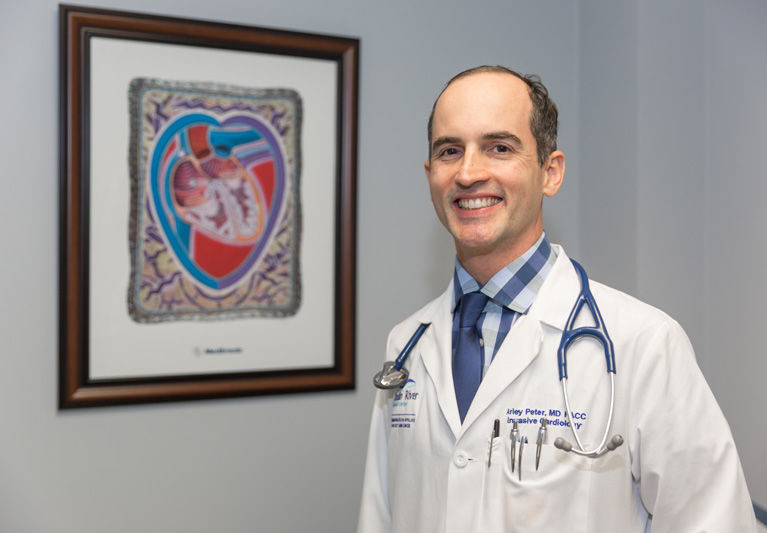
We all know what a person experiencing a heart attack looks like, right? They’re in obvious pain, and may clutch their chest. Their skin is pale and they are sweating. They are having trouble breathing, and they look like they’re about to pass out. Hard to miss, or to misinterpret.
Those are indeed the classic symptoms of a heart attack. But, according to a study done at Wake Forest Baptist Medical Center, it turns out nearly half of all heart attacks do not present in this way; in fact, there may be no signs or symptoms at all.
Despite the lack of outward signs, “silent” heart attacks still affect blood flow to the muscle of the heart (this is called ischemia) and can be just as dangerous as symptomatic heart attacks. The tell-tale signs of a silent heart attack are usually detected later by an electrocardiogram (EKG).
Vero Beach cardiologist Dr. Arley Peter agrees that some heart attacks are not accompanied by any symptoms; other times, he says, there are symptoms, but not the type people associate with heart attacks. “People may feel a little light-headed but have no pain, and they don’t think about going to their doctor for a check-up, even though their doctor wishes they would.”
Researchers from Wake Forest Baptist Medical Center in Winston-Salem, N.C., wanted to investigate the outcome of silent heart attacks – how common and how dangerous are they? They concluded that 45 percent of heart attacks were of the silent type, and that experiencing a silent heart attack tripled the chances of dying from heart disease later in life.
To reach their results, the team pooled data from nearly 9,500 adults who were in involved in a study called Atherosclerosis Risk in Communities, which began way back in 1987. In looking at data over a nine-year period, the Wake Forest researchers found 386 people had heart attacks that featured classic symptoms, and 317 people had silent heart attacks. The researchers continued to look at another 20 years of data to gather information on heart-related disease, deaths from heart attacks, and other health outcomes.
Study leader Dr. Elsayed Z. Soliman and his team also found that although silent heart attacks were more common in men, they were more deadly in women. This outcome was not unexpected, as it is known that men and women experience heart disease in different ways – in fact, 25 percent more women die within a year of having a heart attack than do men, probably, in part, because women are generally older than men when they experience a heart attack. Dr. Soliman says the results of the study underscore the importance of caring for men and women differently when it comes to heart health.
Says Dr. Soliman: “The outcome of a silent heart attack is as bad as a heart attack that is recognized while it is happening. And because patients don’t know they have had a silent heart attack, they may not receive the treatment they need to prevent another one.”
Dr. Peter says the most important thing he tells his patients is to have a “low threshold” when deciding to look for help. “Vero Beach doctors are highly engaged in keeping their patients healthy. Be aware of what your body is telling you, even if the symptoms are subtle. We want to see you to make sure you’re OK.”
Dr. Peter’s office has recently moved. The new address is 787 37th Street, Suite E260. The phone number has also changed; it is 772-999-3996.



